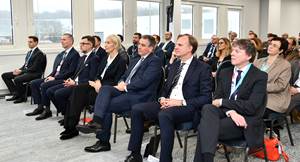Small companies, long-term impact
In a time known for owner “exit strategies,” longevity in family-owned composites businesses is heartening.
A recent announcement by Fibergrate (Dallas, TX, US) that it was celebrating its 50th year in operation, really caught my eye. My first reaction was, “Wow, fiberglass grating has been around for 50 years, already?” I had always thought of it as a more recent invention. Then, it struck me that here was a small company that had managed to make it 50 years in the composites industry. Around the same time, I received an invitation to attend the 50th-year celebration of IDI Composites International (Noblesville, IN, US), a producer of thermoset sheet and bulk molding compounds.
Many small companies like these have operations in small towns, or at least they were small when established. Fibergrate manufactures in Stephenville, TX, which had a population of 9,000 in 1972, but has grown to 19,000 today. Noblesville, IN was a rural community of about 7,500 in 1966, and today is a bustling Indianapolis suburb of 56,000. However, it still retains small-town charm. Although Fibergrate is now an independent subsidiary of a larger company, IDI remains a family-owned business. In a world where many owners are encouraged to think about “exit strategies,” seeing such longevity is heartening. Speaking of family-owned, Dieffenbacher North America Inc. (Eppingen, Germany, population 22,000) was founded in 1873 and started producing presses used to mold Bakelite compounds in 1928. Today, under the fifth generation of family ownership, it is one of the world’s largest producers of composites molding equipment.
I worked for a dozen years for one such small company with an outsized influence on the composites industry, called Fiberite, started in 1948 in Winona, MN, US, by two brothers, Ben and Rudy Miller. The two ran a family business, Miller Waste Mills, which recycled cuttings from clothing manufacturers, particularly those using denim fabrics. Such scraps found use as a lubricant for
train wheels, among other applications. Looking for a new outlet for these waste textiles, they created a cotton fabric-reinforced phenolic molding compound, and established Fiberite to manufacture and sell it into applications such as timing gears for automobiles. The product line expanded to include melamine resin compounds for food trays, then fiberglass-reinforced phenolics, melamines and epoxy compounds. Given this expertise in “putting glue on string,” Fiberite entered the continuous-fiber prepreg business, first with glass fabrics, then carbon fiber fabrics and unidirectional tapes (and some carbon fiber molding compounds as well). They expanded from Winona, adding a molding compound facility in Delano, PA, US, and a prepreg line in Orange, CA, US, to serve the aerospace industry along the US west coast.
Having become major materials suppliers to the composites industry, the Millers added glass-reinforced engineered thermo- plastic molding compounds to their portfolio in the 1970s. They were among the first to offer a long glass (6- to 12-mm) pellet form for structural applications. In 1980, the Millers sold Fiberite to Beatrice Foods, where it became a wholly owned yet independent subsidiary. Because Beatrice already held a dominant position in engineering thermoplastic compounds through another subsidiary (LNP, now part of SABIC), they were forced to sell the thermoplastic operations of Fiberite back to Miller Waste Mills. The Millers established the business as RTP Company, which remains in Winona and is still held by the Miller family.
Beyond its role as a major player in the advanced composites industry, Fiberite had a big influence on the city of Winona, and the local composites community. A number of composites companies thrive today in Winona, some arising out of the entre- preneurial efforts of former Fiberite employees. These include not only RTP but Composite Products Inc. (now part of Core Molding Technologies), PlastiComp, Wenonah Canoe, Coda Composites and a compounding plant of Celanese Corp. (Irving, TX, US) as well. The overall population of Winona hasn’t changed much, growing from 25,000 in 1950 to about 28,000 today, but given this local concentration, Winona State University offers the only accredited undergraduate degree in composites engineering in the US, with 32 graduates in 2015.
After the divestiture of RTP, Beatrice sold Fiberite to Imperial Chemical Industries (ICI) in 1985, which established additional facilities in Texas, Arizona and Europe. In 1995, with the overall company at about 750 employees, ICI sold the company to an investment firm. Throughout these transitions, Fiberite retained its identity as a wholly owned subsidiary. In 1997, in its 49th year
of operation, a major competitor, Woodland Park, NJ-based Cytec Industries (now part of Solvay, Brussels, Belgium), purchased the company and integrated it into its operations. As employees of Fiberite, we didn’t get the chance to celebrate 50 years of independent operation, which makes the Fibergrate and IDI anniversaries all the more special.
Related Content
LIST opens innovation center focusing on sustainable composite materials
The Sustainable Composite Materials and Manufacturing Innovation Centre (SCMM) will be supported by major players in rail, aerospace, automotive and space to transition sustainable composites research to commercialization.
Read MoreBüfa partners with Končar to develop composite electric rail platform
Končar-Električna to use Büfa fire-retardant composite materials for electric vehicle development.
Read MoreComposites reinvent transportation
Celebrating National Composites Week, CW shares ways in which composites continue to evolve mass transit.
Read MoreLongtime partner New Flyer selects Hexagon Purus to outfit hydrogen transit bus
Hexagon Purus will continue to supply Type IV hydrogen tanks for the Xcelsior Charge H2 fuel cell electric bus, the tanks of which will be produced out of Hexagon’s new Maryland facility.
Read MoreRead Next
VIDEO: High-volume processing for fiberglass components
Cannon Ergos, a company specializing in high-ton presses and equipment for composites fabrication and plastics processing, displayed automotive and industrial components at CAMX 2024.
Read MoreAll-recycled, needle-punched nonwoven CFRP slashes carbon footprint of Formula 2 seat
Dallara and Tenowo collaborate to produce a race-ready Formula 2 seat using recycled carbon fiber, reducing CO2 emissions by 97.5% compared to virgin materials.
Read More“Structured air” TPS safeguards composite structures
Powered by an 85% air/15% pure polyimide aerogel, Blueshift’s novel material system protects structures during transient thermal events from -200°C to beyond 2400°C for rockets, battery boxes and more.
Read More


















